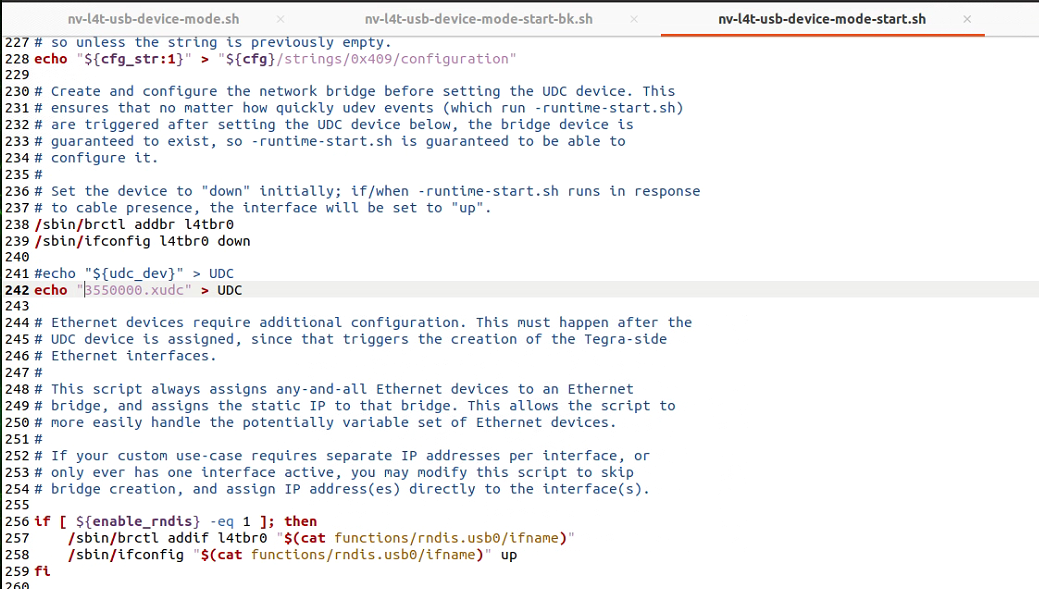nano板启动报错,写入udc时报 no such device
已完成你好,想咨询一下关于启动usb服务时,写入 udc时这个命令 echo "${udc_dev}" > UDC ,报 no such device。要怎么处理? 我的启动服务只执行下面的nv-l4t-usb-device-mode-start.sh这个脚本。

enable_rndis=1
# CDC ACM serial port/UART.
# Linux: Supported automatically.
# Windows 10: Supported automatically.
# Windows other: Requires driver manual selection by use of l4t-serial.inf.
# Mac OS: Supported automatically.
enable_acm=0
# Ethernet using the CDC ECM protocol.
# Linux: Supported automatically.
# Windows: Not supported.
# Mac OS: Supported automatically.
enable_ecm=0
# USB Mass Storage (virtual disk drive/USB memory stick).
# Linux: Supported automatically.
# Windows: Supported automatically.
# Mac OS: Supported automatically.
enable_ums=0
# The IP address shared by all USB network interfaces created by this script.
net_ip=192.168.55.1
# The associated netmask.
net_mask=255.255.255.0
udc_dev_t210=700d0000.xudc
if [ -e "/sys/class/udc/${udc_dev_t210}" ]; then
udc_dev="${udc_dev_t210}"
fi
udc_dev_t186=3550000.xudc
if [ -e "/sys/class/udc/${udc_dev_t186}" ]; then
udc_dev="${udc_dev_t186}"
fi
if [ "${udc_dev}" == "" ]; then
echo No known UDC device found
exit 1
fi
mkdir -p /sys/kernel/config/usb_gadget/l4t
cd /sys/kernel/config/usb_gadget/l4t
# If this script is modified outside NVIDIA, the idVendor and idProduct values
# MUST be replaced with appropriate vendor-specific values.
echo 0x0955 > idVendor
echo 0x7020 > idProduct
# BCD value. Each nibble should be 0..9. 0x1234 represents version 12.3.4.
echo 0x0001 > bcdDevice
# Informs Windows that this device is a composite device, i.e. it implements
# multiple separate protocols/devices.
echo 0xEF > bDeviceClass
echo 0x02 > bDeviceSubClass
echo 0x01 > bDeviceProtocol
mkdir -p strings/0x409
cat /proc/device-tree/serial-number > strings/0x409/serialnumber
# If this script is modified outside NVIDIA, the manufacturer and product values
# MUST be replaced with appropriate vendor-specific values.
echo "NVIDIA" > strings/0x409/manufacturer
echo "Linux for Tegra" > strings/0x409/product
cfg=configs/c.1
mkdir -p "${cfg}"
cfg_str=""
# Note: RNDIS must be the first function in the configuration, or Windows'
# RNDIS support will not operate correctly.
if [ ${enable_rndis} -eq 1 ]; then
cfg_str="${cfg_str}+RNDIS"
func=functions/rndis.usb0
mkdir -p "${func}"
ln -sf "${func}" "${cfg}"
# Informs Windows that this device is compatible with the built-in RNDIS
# driver. This allows automatic driver installation without any need for
# a .inf file or manual driver selection.
echo 1 > os_desc/use
echo 0xcd > os_desc/b_vendor_code
echo MSFT100 > os_desc/qw_sign
echo RNDIS > "${func}/os_desc/interface.rndis/compatible_id"
echo 5162001 > "${func}/os_desc/interface.rndis/sub_compatible_id"
ln -sf "${cfg}" os_desc
fi
# If two USB configs are created, and the second contains RNDIS and ACM, then
# Windows will ignore at the ACM function in that config. Consequently, this
# script creates only a single USB config.
if [ ${enable_acm} -eq 1 ]; then
cfg_str="${cfg_str}+ACM"
func=functions/acm.GS0
mkdir -p "${func}"
ln -sf "${func}" "${cfg}"
fi
if [ ${enable_ums} -eq 1 ]; then
cfg_str="${cfg_str}+UMS"
func=functions/mass_storage.0
mkdir -p "${func}"
ln -sf "${func}" "${cfg}"
# Prevent users from corrupting the disk image; make it read-only
echo 1 > "${func}/lun.0/ro"
echo /opt/nvidia/l4t-usb-device-mode/filesystem.img > "${func}/lun.0/file"
fi
if [ ${enable_ecm} -eq 1 ]; then
cfg_str="${cfg_str}+ECM"
func=functions/ecm.usb0
mkdir -p "${func}"
ln -sf "${func}" "${cfg}"
fi
enable_bulk=1
if [ ${enable_bulk} -eq 1 ]; then
mkdir -p /dev/usb-ffs
cfg_str="${cfg_str}+BULK1"
mkdir -p /dev/usb-ffs/bulk1
func=functions/ffs.bulk1
mkdir -p "${func}"
ln -sf "${func}" "${cfg}"
mount -o mode=0777 -o uid=2000 -o gid=2000 -t functionfs bulk1 /dev/usb-ffs/bulk1
/home/dji/startup_bulk /dev/usb-ffs/bulk1 &
sleep 3
cfg_str="${cfg_str}+BULK2"
mkdir -p /dev/usb-ffs/bulk2
func=functions/ffs.bulk2
mkdir -p "${func}"
ln -sf "${func}" "${cfg}"
mount -o mode=0777 -o uid=2000 -o gid=2000 -t functionfs bulk2 /dev/usb-ffs/bulk2
/home/dji//startup_bulk /dev/usb-ffs/bulk2 &
sleep 3
fi
mkdir -p "${cfg}/strings/0x409"
# :1 in the variable expansion strips the first character from the value. This
# removes the unwanted leading + sign. This simplifies the logic to construct
# $cfg_str above; it can always add a leading delimiter rather than only doing
# so unless the string is previously empty.
echo "${cfg_str:1}" > "${cfg}/strings/0x409/configuration"
cd /sys/kernel/config/usb_gadget/l4t/
echo $PWD
echo ${udc_dev}
echo "${udc_dev}" > UDC
# Ethernet devices require additional configuration. This must happen after the
# UDC device is assigned, since that triggers the creation of the Tegra-side
# Ethernet interfaces.
#
# This script always assigns any-and-all Ethernet devices to an Ethernet
# bridge, and assigns the static IP to that bridge. This allows the script to
# more easily handle the potentially variable set of Ethernet devices.
#
# If your custom use-case requires separate IP addresses per interface, or
# only ever has one interface active, you may modify this script to skip
# bridge creation, and assign IP address(es) directly to the interface(s).
/sbin/brctl addbr l4tbr0
/sbin/ifconfig l4tbr0 ${net_ip} netmask ${net_mask} up
if [ ${enable_rndis} -eq 1 ]; then
/sbin/brctl addif l4tbr0 "$(cat functions/rndis.usb0/ifname)"
/sbin/ifconfig "$(cat functions/rndis.usb0/ifname)" up
fi
if [ ${enable_ecm} -eq 1 ]; then
/sbin/brctl addif l4tbr0 "$(cat functions/ecm.usb0/ifname)"
/sbin/ifconfig "$(cat functions/ecm.usb0/ifname)" up
fi
cd - # Out of /sys/kernel/config/usb_gadget
exit 0
请先登录再写评论。


评论
5 条评论